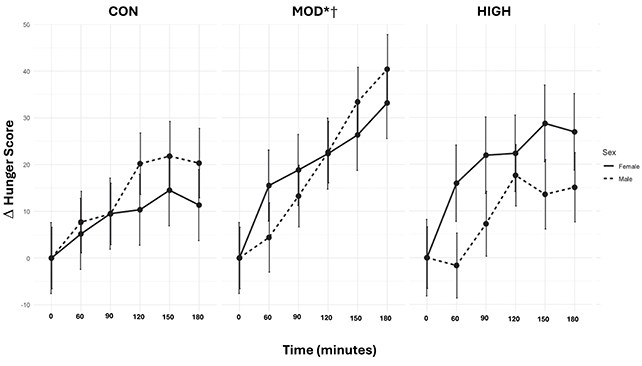ARTICLE AD
If you're looking for an exercise routine that can help you lose weight, you might want to increase the intensity of your workouts: a new study shows that vigorous exercise is better for suppressing appetite than moderate exercise.
The study comes from researchers at the University of Virginia, and involved 14 healthy participants. They were asked to fast overnight, before completing a variety of exercises at different levels of intensity, and then reporting on their appetite levels.
Blood samples were also taken to measure the effects of exercise on the hormone ghrelin, known to play a significant role in regulating appetite. The higher the levels of ghrelin in the body overall, the hungrier we feel.
 Hunger levels reported by control participants who did not exercise and by participants after moderate and high-intensity exercise. (Anderson et al., Journal of the Endocrine Society, 2024)
Hunger levels reported by control participants who did not exercise and by participants after moderate and high-intensity exercise. (Anderson et al., Journal of the Endocrine Society, 2024)"We found that high-intensity exercise suppressed ghrelin levels more than moderate-intensity exercise," says endocrinologist Kara Anderson, from the University of Virginia.
"In addition, we found that individuals felt less hungry after high-intensity exercise compared to moderate intensity exercise."
The difference in ghrelin levels was most significant in female participants, the researchers found, though in terms of self-reported appetite levels there were noticeable drops across both sexes after higher intensity exercises.
Ghrelin can be found in both acylated (AG) and deacylated (DAG) forms in the body, and as well as being linked to appetite, it's also important in other areas, including sleep, memory, and energy balance.
The researchers suggest that there's a specific point at which ghrelin starts diminishing – possibly when the body is producing more lactate than it can handle. Lactate is a byproduct of muscle metabolism that is produced as the body works harder.
"As our protocol utilized blood lactate to determine exercise intensities, these findings suggest that exercise above the lactate threshold may be necessary to elicit a suppression in ghrelin," write the researchers in their published paper.
The relationship between exercise and appetite is actually a pretty complicated one: depending on the type of workout, how long it lasts for, and the profile of the people involved, exercise can both increase and decrease hunger levels.
It's one of those areas where more research is definitely needed – which was part of the aim of this new study. While the study sample was small, it does highlight potential differences between the sexes when it comes to the ghrelin hormone.
As for weight loss, we know that the ability to shed the pounds depends on a whole host of factors – including exercise routines – and that we're all different when it comes to what tactics work best, something this new research sheds more light on.
"Exercise should be thought of as a drug, where the dose should be customized based on an individual's personal goals," says Anderson.
"Our research suggests that high-intensity exercise may be important for appetite suppression, which can be particularly useful as part of a weight loss program."
The research has been published in the Journal of the Endocrine Society.

 2 weeks ago
9
2 weeks ago
9 

